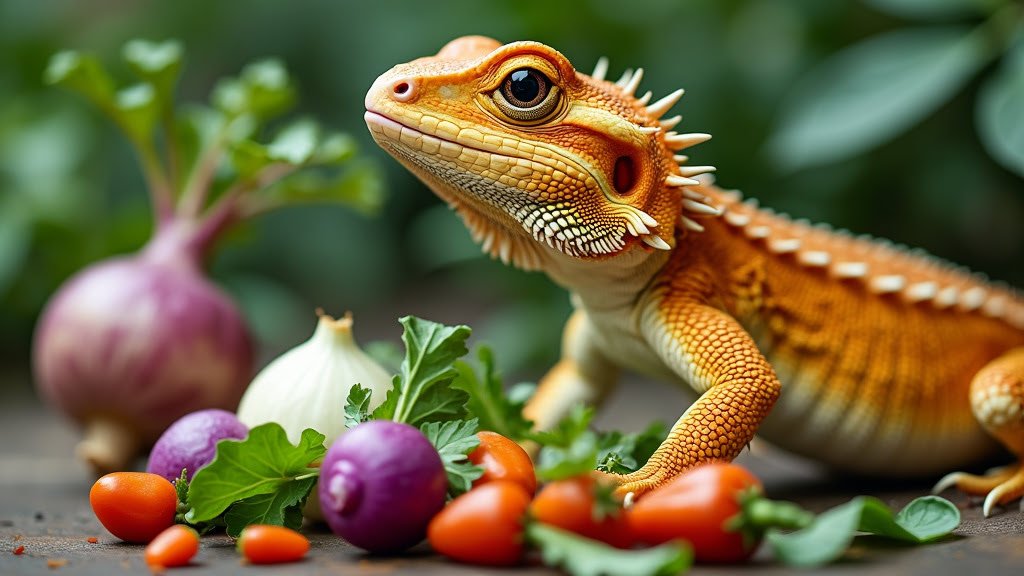Ever looked at your bearded dragon and wondered if they’d enjoy a nice bit of kohlrabi? No? Well, you’re missing out on a world of culinary possibilities for your scaly friend! Let’s dive into the nitty-gritty of bearded dragon diets and see if kohlrabi should be on their menu.
Understanding the Bearded Dragon Diet
In the wild, bearded dragons are nature’s little vacuum cleaners, gobbling up a variety of insects, plants, and flowers. This diverse diet ensures they get all the nutrients they need to thrive. In captivity, it’s up to us to mimic this balanced diet, juggling between protein (usually in the form of insects like crickets and mealworms), a plethora of veggies, and the occasional fruity treat.
Variety is the spice of life, even for bearded dragons. A varied diet not only keeps them happy but it also ensures they receive a broad spectrum of nutrients, preventing any dietary deficiencies.
Nutritional Profile of Kohlrabi
So, what’s this kohlrabi we’re talking about? Kohlrabi, often referred to as a “”cabbage turnip,”” is a versatile vegetable enjoyed by humans around the globe. It’s crunchy, sweet, and packed with nutrients.
Breaking Down Kohlrabi’s Nutrients
Kohlrabi is a powerhouse of vitamins and minerals. Here’s a quick run-down of its nutritional components:
- Vitamin C: Great for boosting the immune system.
- Vitamin B6: Important for brain health and metabolism.
- Potassium: Essential for muscle function and heart health.
- Fiber: Crucial for good digestion.
It’s also low in calories and contains a fair amount of water – perfect for keeping your dragon hydrated.
Is Kohlrabi Safe for Bearded Dragons?
Alright, now let’s address the leafy elephant in the room: is kohlrabi good for your bearded dragon, or should it be avoided like the plague?
Benefits of Kohlrabi
The benefits of kohlrabi are quite promising. Its high vitamin C content can boost your bearded dragon’s immune system, while the fibre aids in digestion. Plus, potassium is a win for maintaining healthy muscles and nerves.
Oxalates and Goitrogens: The Downside
But, as with anything that sounds too good to be true, kohlrabi does have a catch. It contains oxalates and goitrogens. Oxalates can bind with calcium and interfere with its absorption, leading to a deficiency. Goitrogens can interfere with thyroid function.
However, these components are only a concern if kohlrabi is fed in excessive amounts. In small, balanced portions, it can be a safe addition to their diet.
How to Prepare Kohlrabi for Your Bearded Dragon
Preparing kohlrabi for your bearded dragon is as easy as pie! Well, maybe not pie, but you get the drift.
Step-by-Step Guide to Preparing Kohlrabi
- Wash: First, give the kohlrabi a good rinse to remove any pesticides or dirt.
- Peel: Use a peeler to remove the tough outer layer. It’s a bit like unwrapping a vegetable present!
- Cut: Slice the kohlrabi into small, manageable pieces. Think bite-sized chunks that your dragon can easily chomp on.
It’s best to serve kohlrabi as part of a veggie mix, ensuring that your bearded dragon gets a balanced variety of nutrients. Think of kohlrabi as the supporting actor in the grand movie of your dragon’s diet – not the leading role.
Observing Your Bearded Dragon’s Reaction
Introducing a new food to your bearded dragon can be like introducing a cat to water – it can go either way. Here are some tips for judging their reaction:
- Acceptance: If your dragon eagerly gobbles up the kohlrabi, you’re likely on to a winner.
- Rejection: If they turn their nose up at it, don’t worry. Bearded dragons can be picky eaters.
- Digestive Issues: Keep an eye on their stool. If it’s runny or they seem uncomfortable, it might be worth re-evaluating their diet.
From my own experience, my dragons were curious at first but eventually took to it, especially when mixed with other favoured veggies. Patience is key!
Other Safe Vegetables for a Bearded Dragon’s Diet
While kohlrabi can be a great addition, it’s essential to maintain a varied diet. Here are some other veggies to consider:
- Collard Greens: Packed with calcium and vitamin A.
- Butternut Squash: Rich in vitamin C and fibre.
- Bell Peppers: A colourful source of antioxidants.
- Carrots: Great for vision, but be mindful of the sugar content.
Rotating these veggies ensures that your bearded dragon doesn’t get bored and receives a range of nutrients.
Consulting with a Vet
Before making any significant changes to your bearded dragon’s diet, it’s always a good idea to consult with a vet. They can provide tailored advice, especially if your dragon has specific health issues. A quick chat with a reptile vet can save a lot of headaches and ensure your pet stays in tip-top shape.
Conclusion
So, can bearded dragons eat kohlrabi? Absolutely, in moderation! Remember to introduce it slowly, watch for any adverse reactions, and always pair it with other nutritious vegetables. A varied, balanced diet is key to keeping your dragon happy and healthy.
Got any kohlrabi tales or other veggie tips? Drop a comment below. And as always, don’t hesitate to consult your vet for expert advice tailored to your dragon’s needs.
Additional Resources
- More in-depth articles on bearded dragon nutrition.
- Recommended books for bearded dragon care.
- Contact information for exotic pet veterinarians.
Until next time, happy feeding!




